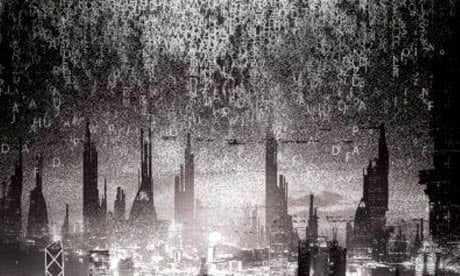Some authors fill a novel with futuristic scenery and jargon and then strenuously, even stertorously, deny that it's science fiction. No, no, they don't write that nasty stuff, never touch it. They write literature. Though curiously familiar with the tropes and conventions of the despised genre, they so blithely ignore the meaning of terms, they reinvent the wheel with such cries of self-admiration, that their endeavours seem a doomed effort to prove that one can write a novel without learning how.
China Miéville knows what kind of novel he's writing, calls it by its name, science fiction, and exhibits all the virtues that make it an intensely interesting form of literature. It's a joy to find this young author coming into his own, and bringing the craft of science fiction out of the backwaters where it's been caught lately between the regressive drag of publishers marketing to a "safe" readership and the bewildering promises of change and growth offered by postmodernism in all its forms and formlessness. Embassytown is a fully achieved work of art.
Only the trash forms of science fiction are undemanding and predictable; the good stuff, like all good fiction, is not for lazy minds. Where the complexity of realistic novels is moral and psychological, in science fiction it's moral and intellectual; individual character is seldom the key. But Miéville's characters are deftly sketched, and his narrator-protagonist, Avice, is a subtler portrait than she seems at first. Nothing in her behaviour offers conventional signals of femininity or unfemininity, an indication that gender may be differently constructed when humanity finds itself dealing with genuine Others.
There are men right now who have never learned how to talk to women. How will we talk to somebody really different – aliens? The Ariekei of Embassytown are immensely unlike us. The problem of communication, the nature of language and of spoken truth, is the novel's core.
When everything in a story is imaginary and much is unfamiliar, there's far too much to explain and describe, so one of the virtuosities of SF is the invention of box-words that the reader must open to discover a trove of meaning and implication. The imaginative leaps involved in decoding such inventions and appreciating their wit can give a reader much pleasure. Miéville sets the bar rather high – I still haven't figured out what a miab is – but most of his neologisms come clear with a nice shock of revelation. My favourite is the immer, which is to our space-time reality as the sea is to our lands: therefore, to travel through space is to immerse. Other elegant images follow, for this is a book by a writer who loves language. And then there are new twists on ordinary words – such as Avice's realisation that she is a simile. Before she could speak the Ariekei language, they made her part of it, a figure of speech, like our boy who cried wolf. She is "the girl who ate what was given her".
The Ariekei want similes because their language, which is innate, does not permit lying. Like Swift's Houyhnhnms, they cannot speak that which is not. This contradicts the nature of language as we know it – language is a wonderful vehicle for untruth and perhaps a necessary vehicle for invention, the leap to the not-yet-existent. But why should all language be like ours? The Ariekei have got on very well with only truth, cultivating a high bio-technology that Miéville describes with gleeful poetry, the living houses with their parasitical furniture, the great farms lurching over the countryside behind their keepers . . . I wondered how the Ariekei thought of making such creatures if they can think only of what is, but that question may be indirectly answered: it seems they crave that which is not, the unthinkable untruth, the lie.
Our species has put a colony on their planet, and we are certainly well qualified to teach them how to lie. They are eager to learn but no good at it at all. A different kind of human ambassador is sent to Embassytown, one who can give them what they want – or an intoxicating imitation of it, a misuse of their language producing a kind of false lie. Such paradoxicals, once heard by the truth-tellers, act on them like heroin or meth – utterly destructive of their grip on reality, and fatally addictive.
The picture of a society shaken, shattered, wrecked to the foundation by a universal drug addiction infecting even the houses, even the farms, for they are all biologically akin, is apocalyptic vision on the grand scale – curiously beautiful, alien in every vivid detail, yet psychologically and socially only too familiar. Science fiction, like all fiction, is a way of talking about who we are.
The story, at first a bit hard to follow, very soon attains faultless impetus and pacing. If Miéville has been known to set up a novel on a marvellous metaphor and then not know quite where to take it, he's outgrown that, and his dependence on violence is much diminished. In Embassytown, his metaphor – which is in a sense metaphor itself – works on every level, providing compulsive narrative, splendid intellectual rigour and risk, moral sophistication, fine verbal fireworks and sideshows, and even the old-fashioned satisfaction of watching a protagonist become more of a person than she gave promise of being. And all along we thought she was only a simile . . .
Ursula K Le Guin's Lavinia is published by Phoenix.

Comments (…)
Sign in or create your Guardian account to join the discussion